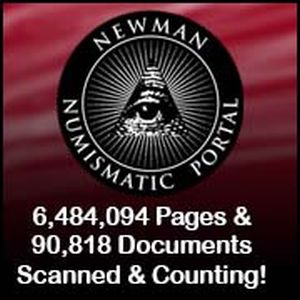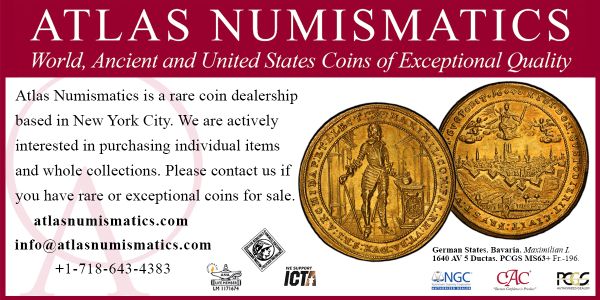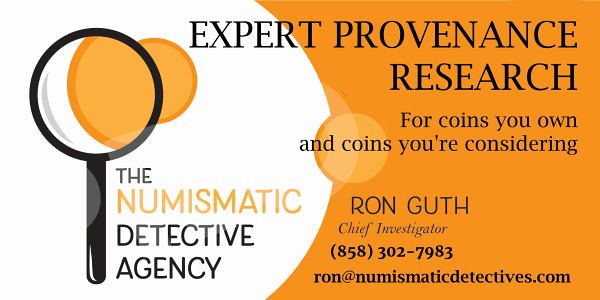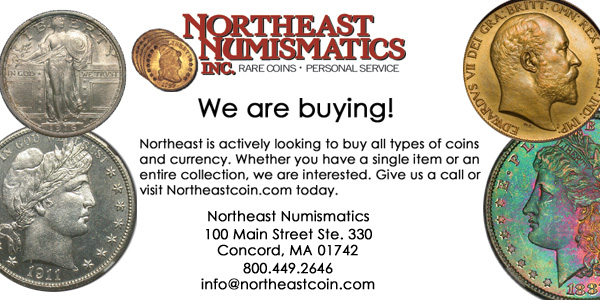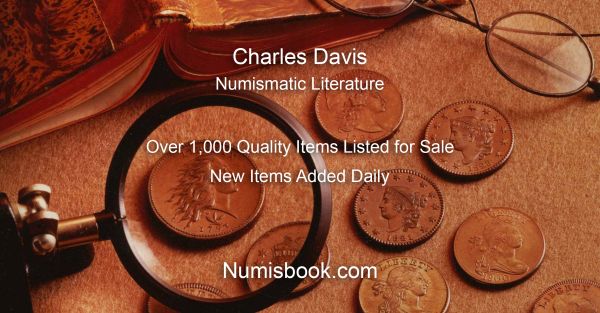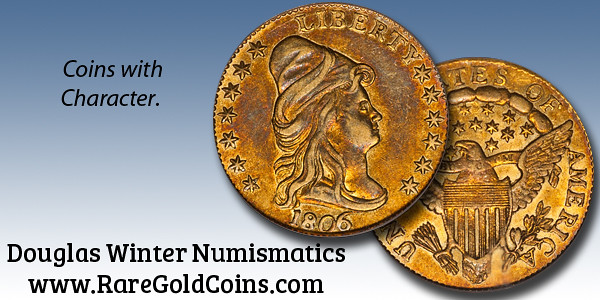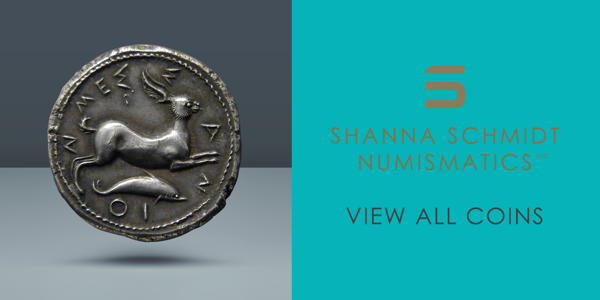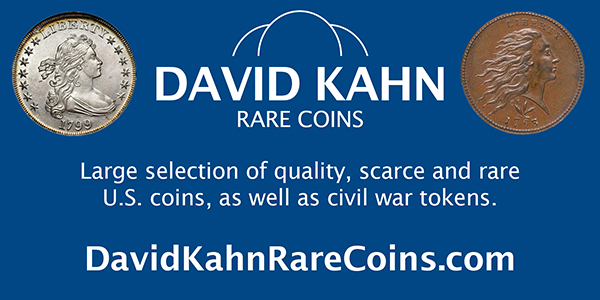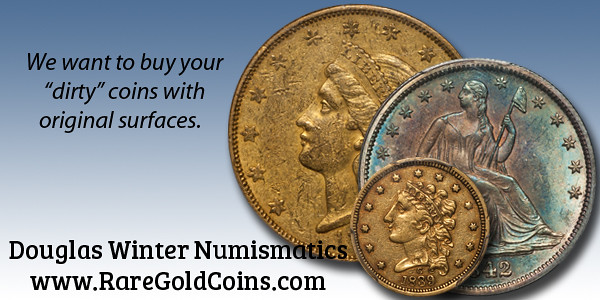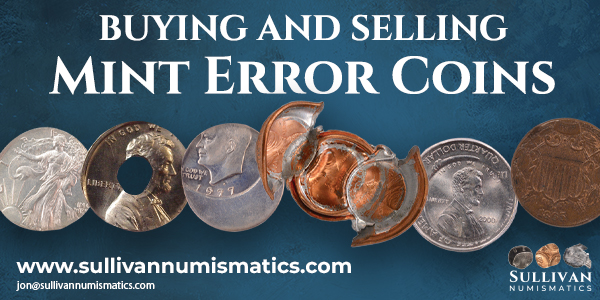
Visit our NBS Sponsors
About UsThe Numismatic Bibliomania Society is a non-profit association devoted to the study and enjoyment of numismatic literature. For more information please see our web site at coinbooks.org SubscriptionsThose wishing to become new E-Sylum subscribers can go to the following web page
Subscribe
MembershipThere is a membership application available on the web site Membership Application To join, print the application and return it with your check to the address printed on the application. Print/Digital membership is $40 to addresses in the U.S., and $60 elsewhere. A digital-only membership is available for $25. For those without web access, write to: Jeff Dickerson, Treasurer AsylumFor Asylum mailing address changes and other membership questions, contact Jeff at this email address: treasurer@coinbooks.org SubmissionsTo submit items for publication in The E-Sylum, write to the Editor at this address: whomren@gmail.com BUY THE BOOK BEFORE THE COINSale Calendar |
- WAYNE'S WORDS: THE E-SYLUM SEPTEMBER 21, 2025
- GUT-LYNT AUCTION 22 NUMISMATIC LITERATURE
- KOLBE & FANNING OCTOBER 2025 SALE ANNOUNCED
- ROBINSON AUCTION 129 NUMISMATIC LITERATURE
- NEW BOOK: WHEN COINS WERE KING
- NEW BOOK: KUSHAN COINS AND HISTORY:
- JAMES ANDREW GUINESSO (1948-2025)
- METAL TOY COINS AND MEDALETS OF GREAT BRITAIN
- VIDEO: WHITMAN PHILADELPHIA SEPTEMBER 2009
- ANA AWARDS MEDALLIC ART AND WRITING
- ACEF BESTOWS TWO KREUZER AWARDS
- HISTORY OF 1856 "UPRIGHT 5" GOLD DOLLAR
- MORE ON THE 16TH 1804 DOLLAR PROVENANCE
- MORE FULBRIGHT SCHOLARS IN NUMISMATICS
- NOTES FROM E-SYLUM READERS: SEPTEMBER 21, 2025
- VOCABULARY TERM: ROLLER DIE
- MICHAEL S. MACDOUGALL (1902-1996)
- VISITING DANSCO'S MANUFACTURING PLANT
- ATLAS NUMISMATICS SELECTIONS: SEPTEMBER 21, 2025
- NUMISMAGRAM MEDAL SELECTIONS: SEPTEMBER 21, 2025
- SOVEREIGN RARITIES AUCTION XIX SELECTIONS
- HOLABIRD SEPTEMBER 2025 SALE: NUMISMATICS
- GUT-LYNT AUCTION 22 COIN SELECTIONS I
- KUENKER AUCTION SALE 429
- COLORADO MINING NOTES
- WORLD'S COLUMBIAN EXPOSITION HOARD
- 2025 ANNUAL MCA MEDAL: ARS ET MEMORIAE
- STACKS BOWERS TO OFFER EMPEROR NORTON BONDS
- BANK OF AMERICA'S FRESNO EXPERIMENT
- FEATURED WEBSITE: JAPANESE BAR MONEY
- ABOUT THIS ISSUE: SEPTEMBER 21, 2025
Content presented in The E-Sylum is not necessarily researched or independently fact-checked, and views expressed do not necessarily represent those of the Numismatic Bibliomania Society.
WAYNE'S WORDS: THE E-SYLUM SEPTEMBER 21, 2025
 New subscribers this week include:
John Deyell, courtesy Paula Turner;
Joshua Puckey and Katie Tillyer, courtesy Steve Hill;
Steve Bienz, courtesy Rich Kelly;
Tim Fitzgerald, courtesy of Ernie Nagy;
and
Jonathan Claydon.
Welcome aboard! We now have 6,868 subscribers.
New subscribers this week include:
John Deyell, courtesy Paula Turner;
Joshua Puckey and Katie Tillyer, courtesy Steve Hill;
Steve Bienz, courtesy Rich Kelly;
Tim Fitzgerald, courtesy of Ernie Nagy;
and
Jonathan Claydon.
Welcome aboard! We now have 6,868 subscribers.
Welcome also to Heritage Auctions - a longtime supporter, Heritage is now also an official sponsor of The E-Sylum. Thank you!
Thank you for reading The E-Sylum. If you enjoy it, please send me the email addresses of friends you think may enjoy it as well and I'll send them a subscription. Contact me at whomren@gmail.com anytime regarding your subscription, or questions, comments or suggestions about our content.
This week we open with three numismatic literature sales, two new books, an obituary, updates from the Newman Numismatic Portal, the ANA and ACEF.
Other topics this week include metal toy coins, the Kreuzer awards, Fulbright scholars in numismatics, roller dies, Mickey MacDougall, DANSCO, fixed price and auction offerings, Colorado mining notes, Emperor Norton bonds, the BankAmericard, and Japanese bar money.
To learn more about the portrait of Philetairos of Pergamon, the Hyman Montagu collection of Roman and Byzantine coins, Attinelli's Numisgraphics, Kushan coins, sculptor Oleg Gavrizon, David Schenkman, Carson City Trade Dollar varieties, the Sierra Leone dollar, St. Benedict of Nursia, coins of the Dutch East Indies, and the Deaf Mute's Gyp Game, read on. Have a great week, everyone!
Wayne Homren
Editor, The E-Sylum
GUT-LYNT AUCTION 22 NUMISMATIC LITERATURE
The 22nd Gut-Lynt coin auction will take place on the first weekend in October, starting on the public holiday (German Unity Day) on 3 October 2025. For the first time, more than 5,000 lots will be offered over three auction days, including Prof. Dr. Wolfram Weiser's extensive numismatic library on Friday, 3 October at 11:30 a.m. (CEST). More than 1,100 lots, mainly relating to ancient numismatics, will be offered, including many rare and sought-after editions, whether bibliophile editions, monographs, journals or important auction catalogues. See an article elsewhere in this issue for more on the overall sale. -Garrett

Lot 618: KÖHLER; J. D. Köhlers Historischer Münz-Belustigung (Köhlers Historical Coin Entertainment). Part Three. Bound together: Part Four. Nuremberg 1731/1732. Estimate: 60 euros

Lot 625: MUSELLI, J. Numismata Antiqua a Iacobo Musellio Collecta et edita Veronae MDCCLI (1751). Volumes 1 and 2. Half leather binding. Estimate: 250 euros
KOLBE & FANNING OCTOBER 2025 SALE ANNOUNCED
Kolbe & Fanning have announced their next numismatic literature sale, featuring books on ancient, world and U.S. numismatics. -Editor
 Kolbe & Fanning Numismatic Booksellers are pleased to announce that we will be holding our next auction sale on Saturday, October 4, 2025. The sale features a wide variety of rare and out-of-print works on ancient, world and U.S. numismatics, the property of over twenty different consignors from around the world. With 500 lots, there is something for everybody.
Kolbe & Fanning Numismatic Booksellers are pleased to announce that we will be holding our next auction sale on Saturday, October 4, 2025. The sale features a wide variety of rare and out-of-print works on ancient, world and U.S. numismatics, the property of over twenty different consignors from around the world. With 500 lots, there is something for everybody.
Some highlights of this first sale include:
ROBINSON AUCTION 129 NUMISMATIC LITERATURE
Michael Zachary notes that Frank Robinson's upcoming sale has 40+ numismatic literature lots opening at bargain prices, including a section on far-east numismatics. Thanks. Here are several selections. See an article is next week's issue for more on the overall sale. NOTE: the literature lots are not illustrated in the catalog. -Editor
510 THE CELATOR, the authoritative magazine of ancient coin collecting, 163 issues 1997-2012, nearly complete run, full of great substantive articles & content. Weight abt 70 lbs, to be shipped in 2 boxes (est cost $60, US only). A fantastic and rare opportunity. Starting bid $100
519 Davenport, European Crowns 1484-1600, 1600-1700, 1700-1800, and Since 1800; 4 hardcovers, tape on last, otherwise nice condition. You need these. Starting Bid $10
NEW BOOK: WHEN COINS WERE KING
Mike Moran's newest book, When Coins Were King, will be published by Whitman and is on presale on Amazon. Here's the summary. -Editor
 When Coins Were King: The Coins, Power Struggles, and Personalities That Defined a Nation by Michael F. Moran is a scholarly and captivating exploration of America's rich monetary history, brought to life with hundreds of vivid images and a compelling narrative. Moran masterfully unveils the untold stories behind the nation's coinage in the late 1800s and early 1900s, a time when the coins that jingled in American pockets had real value in silver and gold. The story starts with the great Comstock Lode--a discovery of gold and silver that outshined the California Gold Rush--and fueled a rebound in our nation's shaky paper-driven economy after the Civil War. It gives the inside story of the outsized personalities that fought life-and-death struggles for economic control and political power at the time.
When Coins Were King: The Coins, Power Struggles, and Personalities That Defined a Nation by Michael F. Moran is a scholarly and captivating exploration of America's rich monetary history, brought to life with hundreds of vivid images and a compelling narrative. Moran masterfully unveils the untold stories behind the nation's coinage in the late 1800s and early 1900s, a time when the coins that jingled in American pockets had real value in silver and gold. The story starts with the great Comstock Lode--a discovery of gold and silver that outshined the California Gold Rush--and fueled a rebound in our nation's shaky paper-driven economy after the Civil War. It gives the inside story of the outsized personalities that fought life-and-death struggles for economic control and political power at the time.
Against this backdrop, Moran details the political shenanigans, widespread corruption at the San Francisco Mint, and an unlikely cast of characters: the young, idealistic President Theodore Roosevelt...the nation's most-famous sculptor, Augustus Saint-Gaudens...the energetic, populist leader William Jennings Bryan...the sage Senator John Sherman...and many others who influenced our nation's coinage.
Full of rich storytelling and free from overwhelming statistics that tend to obscure the human element of defining moments, When Coins Were King offers a fresh perspective on the economic and political struggles that still echo today. A must-read for history buffs, numismatists, and anyone fascinated by the power of money.
NEW BOOK: KUSHAN COINS AND HISTORY:
The British Museum has published a new two-volume work on Kushan coins. -Editor
Kushan Coins and History: A Type Catalogue of Kushan, Kushano-Sasanian and Kidarite Hun Coins Based on the Collection of the British Museum, The British Museum, London 2025 (ISBN 9780861591916), 870 pages in two volumes.
Professor Joe Cribb, Hebei Normal University, and his former colleague Robert Bracey, curator of Asian money at the British Museum, have just published their study of Kushan and related coins. This book is the culmination of twenty years of research.
The book catalogues all the Kushan, Kushano-Sasanian and Kidarite coins in the British Museum, presented in the context of a history of the rulers who issued them and the monetary systems they established. It is designed as a type corpus of the series, so alongside the British Museum coins, the authors also list all the known types of these coins not in the British Museum, drawing on public and private collections from across the world. The catalogue is arranged by ruler, mint and phase of issue to illustrate the structure of the coinage system. The catalogue listing is prefaced by an introduction to the history and coinage of the Kushan kings and their successors and to the history of the British Museum collection.
JAMES ANDREW GUINESSO (1948-2025)
Charlie Davis passed along an obituary of dealer Jim Guinesso. Thank you. Here's an excerpt. -Editor
 James Andrew "Jim" Guinesso, age 77, passed away peacefully on September 17, 2025, with his loving family by his side. Known for his loyalty, humor, and deep devotion to family, Jim's life was one of love, quiet determination, and unforgettable stories.
James Andrew "Jim" Guinesso, age 77, passed away peacefully on September 17, 2025, with his loving family by his side. Known for his loyalty, humor, and deep devotion to family, Jim's life was one of love, quiet determination, and unforgettable stories.
Jim was born on March 13, 1948, in Lawrence, Massachusetts, to Andrew and Martha (Manahan) Guinesso. He grew up alongside his brothers, Robert and Dick, in a close-knit home that instilled in him the values of hard work and loyalty. From a young age, Jim had an inquisitive mind and an appreciation for detail, qualities that would later define his lifelong passion for coins and stamps.
He attended Auburn Village School and graduated from Pinkerton Academy with a high school diploma. After graduation, Jim worked in road construction for several years, contributing to major projects including some ledge cuts for Interstate 93, work he proudly recalled to his children and grandchildren throughout the years. In 1973, driven by his entrepreneurial spirit and love for collecting, Jim opened Derry Coin and Stamp, a business he proudly owned and operated for over 50 years. He became a respected figure in the community, known as a pillar of the coin and stamp world, earning admiration for his honesty, expertise, and enduring relationships with clients and fellow collectors alike.
METAL TOY COINS AND MEDALETS OF GREAT BRITAIN
The latest addition to the Newman Numismatic Portal is a monograph on the metal toy coins of Great Britain. Project Coordinator Len Augsburger provided the following report. -Editor
Metal Toy Coins and Medalets of Great Britain, 1773-1960
 Thomas Engelen has published another installment in his ongoing series on play money, with the latest monograph co-authored with Kai Towe. Metal Toy Coins and Medalets of Great Britain 1773-1960 draws from previous work by David de Sola Rogers and incorporates current web searches for additional catalog entries. Not surprisingly, British royalty is prominent on these pieces, with Queen Victoria easily the most seen. Engelen and Towe welcome reports of any additional pieces - they may be contacted at
kaitowe@hotmail.com and
muis100@hotmail.com.
Thomas Engelen has published another installment in his ongoing series on play money, with the latest monograph co-authored with Kai Towe. Metal Toy Coins and Medalets of Great Britain 1773-1960 draws from previous work by David de Sola Rogers and incorporates current web searches for additional catalog entries. Not surprisingly, British royalty is prominent on these pieces, with Queen Victoria easily the most seen. Engelen and Towe welcome reports of any additional pieces - they may be contacted at
kaitowe@hotmail.com and
muis100@hotmail.com.
THE BOOK BAZARRE
VIDEO: WHITMAN PHILADELPHIA SEPTEMBER 2009
The David Lisot Video Library on the Newman Numismatic Portal can be found at:
https://nnp.wustl.edu/library/multimediadetail/522852
We highlight one of his videos each week in The E-Sylum. Here's one about the September 2009 Whitman Philadelphia Expo. -Editor
ANA AWARDS MEDALLIC ART AND WRITING
At the World's Fair of Money in August, the American Numismatic Association presented their Numismatic Art Award for Excellence in Medallic Sculpture and the Burnett Anderson Memorial Award for Excellence in Numismatic Writing. Here's the press release. -Garrett
During last month's American Numismatic Association's (ANA) World's Fair of Money, hosted in Oklahoma City, members who have contributed to the hobby in profound ways were recognized. The Numismatic Art Award for Excellence in Medallic Sculpture and the Burnett Anderson Memorial Award for Excellence in Numismatic Writing were presented during the 134th Anniversary Awards Banquet.
The ANA's Numismatic Art Award for Excellence in Medallic Sculpture is an annual honor given to an artist whose lifetime work in the field rises above all others. The 2025 recipient is Oleg Gavrizon, a renowned sculptor and medalist based in Netanya, Israel.
ACEF BESTOWS TWO KREUZER AWARDS
The Anti-Counterfeiting Educational Foundation (ACEF) will award two numismatists with the Kreuzer Award for their work of identifying and educating the public about counterfeit coins. Here is the press release. -Garrett
 The Anit-Counterfeiting Educational Foundation will honor a collector and a coin dealer for their
work in identifying counterfeit coins and educating the public about the dangers of online scams
related to fakes during a special awards presentation Friday, Sept. 26, at 11 a.m. in Room 12 of
the Donald E. Stephens Convention Center in Rosemont, IL, during the Great American Coin and
Collectibles Show.
The Anit-Counterfeiting Educational Foundation will honor a collector and a coin dealer for their
work in identifying counterfeit coins and educating the public about the dangers of online scams
related to fakes during a special awards presentation Friday, Sept. 26, at 11 a.m. in Room 12 of
the Donald E. Stephens Convention Center in Rosemont, IL, during the Great American Coin and
Collectibles Show.
Don Ketterling, a member of the ACEF Board of Directors, will present the recipients with the Alan Kreuzer Memorial Award, which recognizes the anti-counterfeiting efforts of collectors, dealers, law enforcement agents or others who are diligently trying to protect the numismatic marketplace.
HISTORY OF 1856 "UPRIGHT 5" GOLD DOLLAR
A new documentary discusses the important historical role played by the 1856 "Upright 5" gold dollar and the mystery it was key in unraveling. Here is the press release from Fancaster Inc., which funded and produced the documentary video. -Garrett
An 1856 gold dollar coin's story, buried in historical archives for nearly 170 years, is revealed in "Buried History – How Counterfeiting Changed America," a newly released documentary video posted on YouTube at https://youtu.be/PqKJUekcryI?si=BxRisDyh-pffxuZP.
MORE ON THE 16TH 1804 DOLLAR PROVENANCE
John Dannreuther submitted this note relating to the provenance of the James A. Stack 1804 dollar. Thanks! -Editor
In response to Doug Ward's comments in the latest E-Sylum, I would like to make a few comments.
I did read his article, as I am a Fellow of the ANS and read the mag each time I receive it.
His article was great! It had some documents that I had not seen.
However, I have some documents that he evidently has not seen. In 2004, at the John Ford literature sale by Kolbe, Kevin Lipton bought a folder of letters detailing the Woodin $50 Half Union story. Kevin gave it to Charles Anderson, who had one of the greatest pattern collections of all time (later sold to Bob Simspon for 23 million). On a train ride from Baltimore to D.C. with Kevin, I read all the letters.
MORE FULBRIGHT SCHOLARS IN NUMISMATICS
Last week, Jeff Burke submitted an article on Fulbright Scholars in the numismatic world. Here are some more. First up is Ken Berger, who submitted these notes. -Editor
 Ken Berger
Ken Berger
I obtained my doctorate in Environmental Science & Engineering from UCLA. A few years later, I returned to school and obtained a second master's degree; this time in Asian Studies. Upon completion of this degree, I was immediately awarded a Fulbright Fellowship in 1989-90 at Tunghai University in Taichung, Taiwan.
The following year, I was named a Visiting Specialist by Taiwan's National Science Council and for the next three years a Visiting Professor by Tunghai University. Besides my teaching duties, I also performed research on feng shui as a natural science and the impacts of oil spills in the South China Sea.
While overseas I gave a seminar at the University of San Carlos in Cebu, Philippines. Attending this seminar was Prof. Humaida Jumalon, the daughter of Prof. Julian Jumalon. After the seminar, I mentioned to her my interest in WW2 Philippine emergency & guerrilla paper money. She told me that her father had designed many of these notes for various provinces during the war. This led to a number of visits with her father during the five years I was living overseas. The initial result of these meetings was an article in The Numismatist ("Cebu Emergency Notes of World War II", The Numismatist (May 1993), Vol. 106, No. 5: 643-648). This was the first major study of the Cebu notes and, more importantly, was the first time Prof. J. Jumalon's involvement became well-known throughout the numismatic community.
NOTES FROM E-SYLUM READERS: SEPTEMBER 21, 2025
The Death of Sarah Elizabeth Freeman
Scott Miller writes:
 "Regarding Pete Smith's mention of numismatic writers who were murdered, I would add Sarah Elizabeth Freeman, who wrote Medals Relating to Medicine and Allied Sciences in the Numismatic Collection of the Johns Hopkins University, published in 1964. She died of starvation after being locked in a closet by burglars. The news article can be found here
https://www.upi.com/Archives/1986/03/23/Three-men-charged-in-curators-starvation-death/2185511938000/
"Regarding Pete Smith's mention of numismatic writers who were murdered, I would add Sarah Elizabeth Freeman, who wrote Medals Relating to Medicine and Allied Sciences in the Numismatic Collection of the Johns Hopkins University, published in 1964. She died of starvation after being locked in a closet by burglars. The news article can be found here
https://www.upi.com/Archives/1986/03/23/Three-men-charged-in-curators-starvation-death/2185511938000/
"This is the link to her papers at Johns Hopkins Libraries, which notes her work on coins and medals, incuding research on Charles Cushing Wright. https://aspace.library.jhu.edu/repositories/5/resources/1205"
So sad. Thank you. -Editor
To read the earlier E-Sylum article, see:
GEORGE FREDERICK GOULD (1912-1991)
(https://www.coinbooks.org/v28/esylum_v28n37a14.html)
Other topics this week include the Fractional Currency Fruitcake Box, the finest of the 1853-o no arrows half dollar, and Carson City Trade Dollar Varieties. -Editor
VOCABULARY TERM: ROLLER DIE
Here's another entry from Dick Johnson's Encyclopedia of Coin and Medal Terminology. -Editor
Roller Die. (1) A die engraved on the curved surface of a cylinder which is rolled over metal strip under pressure impressing a coin design on the sheet metal, which is blanked afterwards. First created in 1551, in Augsburg, Germany, by Kaspar Goebels, the process spread to other parts of Europe with very mixed results. The process was called taschenwerke and the roller mill was termed the walzenwerke. A larger coin could be made by this method in contrast to stamping a blank in a press. It's shortcomings, however, was the edges of the coin after it was trimmed or blanked from the strip, it had striations on the edge and burrs on one side. These had to be smoothed by hand.
MICHAEL S. MACDOUGALL (1902-1996)
E-Sylum Feature Writer and American Numismatic Biographies author Pete Smith submitted this article on "Card Detective" and coin columnist Mickey MacDougall. Thanks! -Editor
 Want to flush out a crooked dealer at the card tables? Call on Mickey MacDougall, "The Card
Detective." Want to expose a tall tale in numismatics? Perhaps MacDougall can help with that.
Want to flush out a crooked dealer at the card tables? Call on Mickey MacDougall, "The Card
Detective." Want to expose a tall tale in numismatics? Perhaps MacDougall can help with that.
Michael MacDougall was born as Samuel Smiley MacDougall on October 22, 1902, in Philadelphia, Pennsylvania. His father was a grocer, William J. MacDougall (1870-1955). His mother was Margaret Jane "Janny" Belford (1870-1953). Both of his parents were from Irish emigrant families.
Slight in stature at age 14, he landed a job with Horace Goldin in vaudeville as the boy on the rope in an Indian rope trick. He studied magic and learned card tricks. He visited gambling parlors and watched the action. MacDougall made friends with some of the dealers. He taught them card tricks and they taught him gambling tricks. By age 18, he was one of the best card manipulators in the business.
VISITING DANSCO'S MANUFACTURING PLANT
Justin Hinh, aka Dansco Dude, recently visited the Dansco manufacturing plant and submitted this report. Thank you! -Editor
In March and August of this year, I had the incredible opportunity to visit the Dansco manufacturing plant in Sumas, Washington. During my two visits, the husband-and-wife team of Steve and Leticia Bruce graciously welcomed me into their facility and answered many questions from collectors.
Walking through their factory floor revealed a treasure trove of numismatic history. As a researcher dedicated to the history of both Dansco and the broader world of coin albums, it was an unforgettable experience.
The Dansco family has asked me to maintain the privacy of their internal operations, so I am not able to share pictures of the production process. However, I can share this humorous photo I took right outside their entrance.
ATLAS NUMISMATICS SELECTIONS: SEPTEMBER 21, 2025
Atlas Numismatics has updated their website with 346 new coins, medals, and tokens at fixed prices. Select items are discussed below. -Garrett
NUMISMAGRAM MEDAL SELECTIONS: SEPTEMBER 21, 2025
Numismagram's Jeremy Bostwick sent along these four medals from his most recent upload of new material to his site. For all of the new items, please visit https://www.numismagram.com/inventory. -Editor
103246 | GERMANY. Bayern (Bavaria). Agricultural Association silver Award Medal. Issued circa 1901-1913 for loyalty and diligence (47mm, 49.28 g, 12h). By Alois Börsch. DER LANDWIRTHSCHAFTLICHE VEREIN IN BAYERN, plow right // LOHN / DER TREUE / UND DES / FLEISSES in four lines within garlanded oak wreath. Edge: Plain. Hauser 668. PCGS MS-62. Extremely lustrous and prooflike, with sparkling, iridescent toning across both sides. $365.
SOVEREIGN RARITIES AUCTION XIX SELECTIONS
Sovereign Rarities will hold their Auction XIX on Tuesday September 23rd. Here is a final group of selections. Great coins. -Editor
Sovereign Rarities proudly present their 19th Auction to be held at their London office on Tuesday 23rd September in conjunction with the Royal Mint. The online catalogue is now available to view at www.sovr.co.uk with images and estimates of every lot, as well as being hosted on a number of other auction platforms with highlights on social media too. This is the final instalment of highlights for The E-Sylum before sale day on Tuesday starting 10am UK time.
The sale commences with the magnificent Thorburn Collection of coins of 1887 mostly struck for the Golden Jubilee of Queen Victoria, consisting of a plethora of as many UK currency coins, patterns and proofs of the celebration as possible, collected over 30 years. The sale now has its own pdf flipbook with all relevant introductory passages at this link SOVR Auction XIX - Featuring the Thorburn Collection - Flip Book Catalogue
HOLABIRD SEPTEMBER 2025 SALE: NUMISMATICS
Here's a selection of numismatic lots that caught my eye in the September 2025 Holabird Americana sale. -Editor
Lot 3000: Series 1935 A, signed by Julian & Morgenthau. Stamped Hawaii twice on the front and across the back. Crisp uncirculated, except one corner was folded at one time. The purpose of these notes was should there have been an Imperial Japanese invasion of the islands, the US government could immediately declare any Hawaii-printed notes worthless, due to their easy identification. Beginning on August 15, 1942, no other paper U.S. currency could be used except under special permission.
GUT-LYNT AUCTION 22 COIN SELECTIONS I
The 22nd Gut-Lynt coin auction will take place on the first weekend in October, starting on the public holiday (German Unity Day) on 3 October 2025. For the first time, more than 5,000 lots will be offered over three auction days. October 4th's selections comprise of coins and medals from antiquity to the present day. We would like to present some of the highlights here. -Garrett
The auction on Saturday, 4 October at 9:00 a.m. (CEST) will begin, as is tradition, with ancient coins. Around 500 lots will be offered, ranging from Celtic coins to Greek and Roman coinages to issues from Byzantium and Islamic rulers. In addition to attractive individual pieces, the many well-described lots with moderate starting prices are particularly noteworthy.
KUENKER AUCTION SALE 429
A separate catalog presents the second part of the Verschoor Collection. It contains coins from Dutch overseas territories, and is therefore all about the VOC, the Dutch East India Company. Its logo with the three well-known letters can be seen on many issues. Other silver coins that were created for long-distance trade in the Netherlands depict the so-called silver rider. It was so well-known that it was used as a countermark for Indish coins that were to be used for financial transactions in Batavia. -Garrett
A 1/4 gulden from Utrecht, produced for the Dutch East Indies in 1900, is extremely rare. Only five specimens of this type were minted.
Those attending the auction in person will also have the opportunity to view the material of auction 430, featuring part 4 of the Lodewijk S. Beuth Collection, this time containing Dutch banknotes. This important auction will be held as an eLive Premium Auction on 20 October.


No. 2598: Issues of the Province of Utrecht. Off-metal strike in gold from the dies of the Ku.-1/2 duit, 1758, Utrecht. Extremely rare. Extremely fine. Estimate: 3,000 euros


No. 2620: Java. 1693 Dutch ducat, of Holland, mint of Dordrecht, with countermark of Batavia (of 1700) on the obverse. Extremely rare. Extremely fine to FDC. Estimate: 5,000 euros


No. 2621: Java. 1 rupee, 1692/3, from India with countermark of Batavia. Extremely rare. Coin: Very fine. Countermark: Extremely fine. Estimate: 5,000 euros


No. 2623: Java. 1 rupee, 1783, Batavia. Extremely rare. Adjusted, extremely fine. Estimate: 7,500 euros


No. 2648: Dutch East Indies. 1/2 rupee, 1743, Surabaya. Extremely rare. About extremely fine. Estimate: 5,000 euros


No. 2680: Wilhelmina, 1890-1948. 1/4 gulden, 1900, Utrecht for the Dutch East Indies. Only 5 specimens minted. Extremely fine to FDC on a polished planchet. Estimate: 7,500 euros
To order a catalog contact Künker, Nobbenburger Straße 4a, 49076 Osnabrück; phone: +49 541 / 962020; fax: +49 541 / 9620222; or via e-mail: service@kuenker.de. You can access the auction catalogs online at www.kuenker.de. If you want to submit your bid from your computer at home, please remember to register for this service in good time.
COLORADO MINING NOTES
I missed this week's dinner of my Northern Virginia numismatic social group Nummis Nova because of a conflicting family birthday dinner. But Dave Schenkman attended, noting that "turnout was good, although a couple of members bailed out because of crappy weather and worse traffic."
Dave kindly sent along images of his newps - a group of eight rare Colorado mining notes purchased from the recent Stacks sale. Thanks! -Editor
Dave adds:
"These are extremely rare; probably 2-3 known of each, and at least one is unique."
WORLD'S COLUMBIAN EXPOSITION HOARD
Charles Morgan of CoinWeek wrote about an interesting hoard from the World's Columbian Exposition. Here's an excerpt - see the complete article online. -Editor
One hundred and thirty-two years ago, Vance LaRue Wilson, a 40-year-old Iowan, attended the World's Columbian Exposition in Chicago, Illinois. For many attendees, the Chicago World's Fair was their first time seeing a Ferris Wheel, electric lights, automatic dishwashers, moving pictures, or zippers. Wilson, a man of considerable wealth, was captivated by the spectacle and took home numerous souvenirs, including coins, medals, and tokens that would later surprise his heirs with their value.
2025 ANNUAL MCA MEDAL: ARS ET MEMORIAE
The Medal Collectors of America (MCA) have released their 2025 annual medal, "Ars Et Memoriae" by Susan Taylor. Here is the press release. -Garrett
"Ars et Memoriae"
By Susan Taylor
Bronze, struck; 3" (76.2 mm)
Edition size: 50
Price: $200. Including shipping within the domestic U.S.
PayPal fees are additional
Purchase here:
https://www.medalcollectors.org/membership/medals
Obverse:
Since the fifteenth century the medal, as a distinctive art form, has been a popular, versatile, extremely eAective, and compact means of disseminating information to a widespread audience traditionally, at least until the modern era, through a combination of low-relief and text.
With this purpose in mind, the Muse of History, CLIO, has here been modified to put aside the traditional tools of her means of communication, the scroll, a pen, and a bottle of ink, to become a visual artist sculpting the model for the reverse of this medal showing Pegasus.
STACKS BOWERS TO OFFER EMPEROR NORTON BONDS
Stack's Bowers Currency Specialist & Lead Currency Cataloger Bradley Charles Trotter wrote a short article about their upcoming sale of two rare Emperor Norton I bonds. -Editor
Issued by a beloved madman who roamed the streets of San Francisco until his death in 1880, these "bonds" issued by the "Imperial Government of Norton I" are not merely a numismatic reflection of this colorful personality who stands firmly among the ranks of San Francisco's most noted citizens, but a rare opportunity for collectors.
Both pieces trace their pedigrees back to the 1960s and more recently to the collection of John J. Ford, Jr. (Part XX) which sold in 2007. These notes are set to be offered together in the November 2025 Showcase Auction alongside a number of exceptional rarities that includes some that were last offered in the Ford auctions of the 2000s.
BANK OF AMERICA'S FRESNO EXPERIMENT
Coins and paper money still aren't dead yet, but credit cards are a big and still growing way to pay for people worldwide. But these ubiquitous cards had to start somewhere, and that somewhere was Fresno, CA in 1958. This article delves into the rollout of what we now know as Visa. Here's an excerpt - see the complete article online. -Editor
 No application. No background check. No visit to the bank. Just trust.
No application. No background check. No visit to the bank. Just trust.
This was September 18, 1958, and Joseph P. Williams had just unleashed the most audacious financial experiment in American history.
Williams wasn't a banker—he was a former infantry officer who'd talked his way into Bank of America by driving cross-country and begging legendary founder A.P. Giannini for a job. By the mid-1950s, he was running the bank's think tank, tasked with solving an increasingly obvious problem.
The Problem That Wasn't Supposed to Exist
Middle-class Americans were drowning in paperwork. They carried multiple charge accounts—Sears, Mobil, local department stores. Each came with separate bills, payment dates, and credit policies. It was financial chaos disguised as convenience.
What consumers needed was obvious: one card that worked everywhere. What nobody could figure out was how to make it profitable.
FEATURED WEBSITE: JAPANESE BAR MONEY
This week's Featured Website is The Rectangle Coins: Japanese Bar Money by Lianna Spurrier.
Japanese Bar Money
In 1599, Japan issued a rectangular gold piece now known as the Gaku ichibu. This regional issue from Edo blossomed into a 250-year series and branched into more denominations, eventually spilling over into silver pieces in the mid-1700s. These rectangular pieces are sometimes referred to as "bar money" for their unusual bar-like shape. They were minted through 1869, when Japan's old currency system was replaced by the yen.
While an incredibly interesting series, they are also phenomenally difficult to research for English speakers. This website hopes to help fill that gap and will eventually become a book.
https://rectanglecoins.com/
ABOUT THIS ISSUE: SEPTEMBER 21, 2025
As mentioned I had to miss our Nummis Nova meeting this month. And on Saturday I was distracted from E-Sylum work by various chores including bill paying, laundry, shredding, filing, and some desk cleaning.
Further on the non-numismatic front, I saw an interesting stock certificate in the International Bond & Share Society September 2025 Newsletter - a signed certificate from the Nikola Tesla Company. I remember being awed when my numismatic mentor Glenn Mooney told me that as a young engineer at Westinghouse Corporation, he met Nikola Tesla. In another amazing connection, Glenn's daughter's favorite teacher came to the U.S. after marrying an American soldier. Her job during the war? - personal secretary to Nazi leader Hermann Goering.
My own brushes with fame include meeting such diverse personalities as Nobel Prize winner Herbert Simon, Sony Corp cofounder Akio Morita, AT&T CEO Randall Stevenson, singer Ben E. King, rock pioneer Bo Diddley and the "Queen of the Blues," Koko Taylor. -Editor

